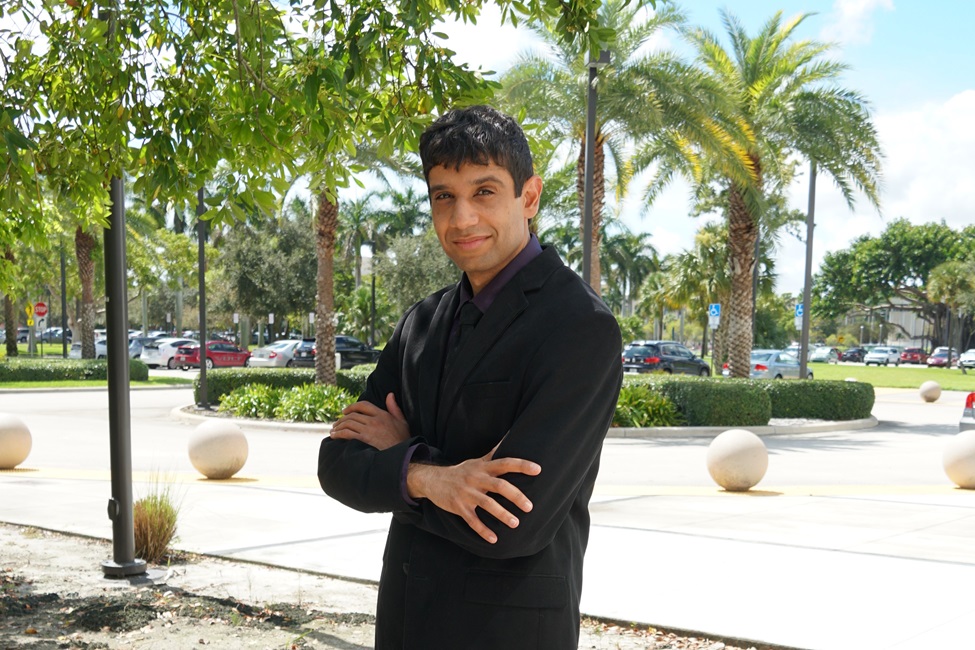Dr. Michael DeGiorgio Awarded Prestigious NIH Grant for Advancements in Computational Genomics and Human Health
by Behnaz Ghoraani | Friday, Nov 22, 2024
Dr. Michael DeGiorgio, an Associate Professor and Associate Chair in the Department of Electrical Engineering and Computer Science and an affiliated faculty of the Center for SMART Health at Florida Atlantic University, recently received a National Institutes of Health (NIH) Maximizing Investigators’ Research Award for Established Investigators (MIRA EI) of over $1.8M. This grant supports comprehensive research programs that promise to advance our understanding of general medical sciences significantly.
Dr. DeGiorgio's educational journey began with degrees in mathematics and computer science from the University of Central Florida and a Ph.D. in bioinformatics from the University of Michigan. His career includes a vital postdoctoral fellowship at the University of California, Berkeley, which paved the way for faculty positions at Pennsylvania State University and, since 2019, at FAU. His commitment to advancing biological data science is further underscored by his prestigious Alfred P. Sloan Fellowship in 2017 and his previous NIH MIRA award in 2018. The Alfred P. Sloan Fellowship is a notable honor, awarded annually to 126 researchers across the United States and Canada, with only 12 selected in DeGiorgio's field. This award recognizes researchers for their distinguished performance and unique potential to contribute substantially to their fields.
Dr. DeGiorgio’s current research focuses on developing advanced computational methods to explore the regions of the genome influenced by natural selection. These genomic insights are crucial for understanding traits that affect organismal responses to diseases and medications. For instance, his studies have unveiled adaptive traits from ancient human and Neanderthal interactions and have provided a new understanding of human immune response variations, cancer adaptations in modern environments, and even evolutionary changes in rattlesnake venom.
His work aligns seamlessly with the Center for SMART Health at FAU, contributing significantly to the center's analytics arm. By deciphering the genetic foundations of health-related traits, Dr. DeGiorgio's research aids in shaping tailored medical interventions that are based on evolutionary genetics and computational biology. This approach not only furthers scientific knowledge but has direct implications for improving public health strategies.
Dr. DeGiorgio enhances the interdisciplinary nature of his projects by actively collaborating with colleagues such as Drs. Raquel Assis, Hill Zhu, and Max Caputi. The collaborative environment at the Center for SMART Health fosters a synergy that is crucial for the complex nature of genomic and health analytics research.
In discussing his approach to grant proposal preparation, Dr. DeGiorgio emphasizes the importance of a clear, strategic outline that addresses significant challenges in genomics while remaining accessible to a broad scientific audience. This balance ensures that the innovative potential of his research is both comprehensible and compelling, a factor that has repeatedly contributed to his success in securing competitive funding.
Dr. DeGiorgio also measures the impact of his work through the success of his mentees and the scientific community's engagement with the open-source software developed by his lab. His comprehensive approach to mentorship and research dissemination reflects his commitment to advancing both the field of computational genomics and the careers of upcoming scientists.
With this recent NIH grant, Dr. Michael DeGiorgio is set to continue his impactful research at the intersection of computational genomics and human health, driving forward our understanding of genetic adaptations and their implications for future medical breakthroughs.